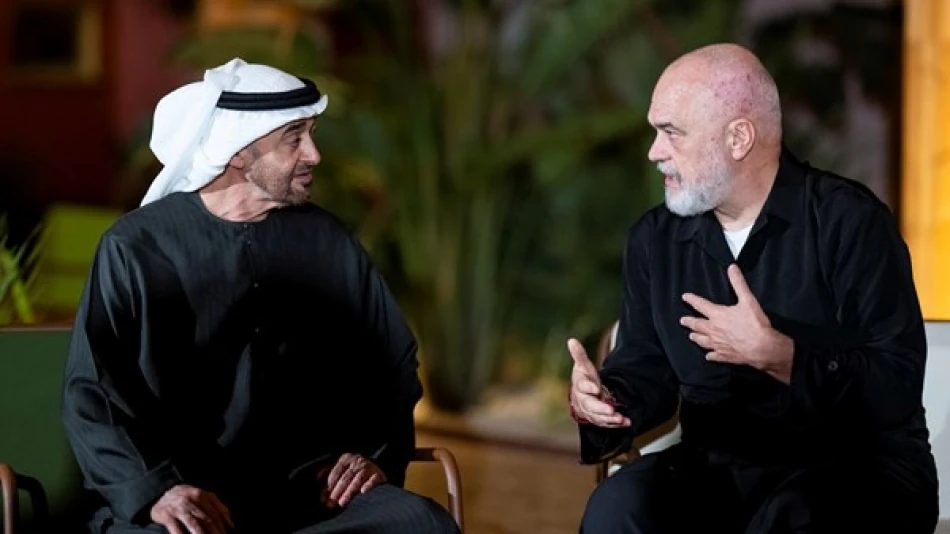
UAE President Holds Talks to Strengthen Ties with Albanian Prime Minister
UAE President Deepens Ties with Albania as Gulf States Expand Balkan Influence
UAE President Sheikh Mohammed bin Zayed Al Nahyan held strategic talks with Albanian Prime Minister Edi Rama in Tirana, signaling the Gulf state's growing interest in Southeastern Europe as it diversifies diplomatic and economic partnerships beyond traditional spheres. The meeting focused on bilateral cooperation across development priorities and regional stability, reflecting a broader UAE strategy to strengthen ties with European nations amid shifting global alliances.
Strategic Partnership Takes Shape
During the Tirana meeting, Sheikh Mohammed bin Zayed emphasized the mutual development priorities that could bind the two nations closer together. The UAE leader took to social media platform X to highlight discussions on "enhancing the growing relations between our two countries, especially in areas that serve mutual development priorities."
The talks extended beyond bilateral cooperation to encompass regional and international peace and stability, suggesting both nations see value in coordinating their foreign policy approaches in an increasingly complex geopolitical landscape.
UAE's Expanding European Footprint
Beyond Traditional Partnerships
This diplomatic engagement represents part of the UAE's systematic expansion into European markets and partnerships. Unlike its historical focus on Western European powerhouses like Germany and France, the Emirates is now actively courting Balkan and Eastern European nations that offer strategic advantages in terms of EU access, energy corridors, and investment opportunities.
Albania, as a NATO member and EU candidate country, provides the UAE with a potential gateway to European markets while offering investment opportunities in sectors ranging from energy to tourism infrastructure.
Economic Implications
For investors and businesses, this diplomatic warming signals potential new trade corridors and investment flows. The UAE's sovereign wealth funds and state-backed enterprises have increasingly looked toward emerging European markets for diversification, particularly as traditional Western markets become more regulated and competitive.
Albania's strategic position along the Adriatic Sea and its growing tourism sector align well with UAE investment patterns, which have historically favored hospitality, real estate, and logistics infrastructure.
Regional Context and Broader Implications
Balkan Competition Intensifies
The UAE's engagement with Albania occurs against a backdrop of intensifying competition for influence in the Balkans. China, Russia, Turkey, and Gulf states have all increased their presence in the region, often filling gaps left by slower EU integration processes.
This diplomatic outreach mirrors similar UAE initiatives in Serbia, Montenegro, and other Balkan nations, where Gulf capital has funded infrastructure projects and real estate developments. The strategy appears designed to establish the UAE as a reliable partner for nations seeking alternatives to traditional European or Russian economic dependence.
Timing and Geopolitical Significance
The meeting comes at a crucial time when European energy security and supply chain diversification have become paramount concerns. Albania's position as a potential energy transit hub, combined with the UAE's role as a major energy producer and logistics center, creates natural synergies for cooperation.
Furthermore, both nations have positioned themselves as moderate voices in their respective regions, potentially offering a stabilizing influence in areas prone to geopolitical tensions.
Looking Forward
This diplomatic engagement likely represents the beginning of a more structured partnership rather than a one-off meeting. The UAE's track record suggests that high-level diplomatic visits typically precede concrete business deals and investment commitments.
For Albania, stronger ties with the UAE could provide crucial capital inflows and technical expertise as it continues its EU accession process. For the UAE, Albania offers another stepping stone in its strategy to become a truly global player beyond its traditional Middle Eastern sphere of influence.
The success of this partnership will likely depend on how effectively both nations can translate diplomatic goodwill into tangible economic cooperation and whether Albania can offer the UAE the European market access and strategic positioning it seeks.
Most Viewed News

 Layla Al Mansoori
Layla Al Mansoori






